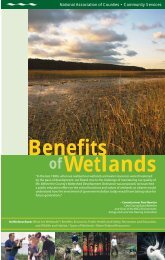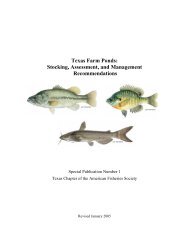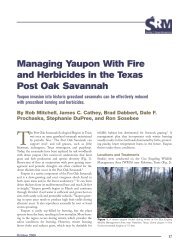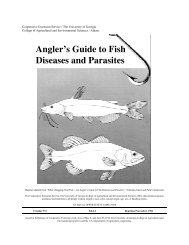Conservation Easements, A Guide for Texas Landowners
Conservation Easements, A Guide for Texas Landowners
Conservation Easements, A Guide for Texas Landowners
Create successful ePaper yourself
Turn your PDF publications into a flip-book with our unique Google optimized e-Paper software.
What are the “conservation purposes” recognized by the Internal Revenue Code<br />
The Internal Revenue Service Code Section 170(h) requires that conservation easement<br />
donations meet one or more of the following conservation purposes:<br />
• preserves land <strong>for</strong> public outdoor recreation or education;<br />
• protects relatively natural habitats of fish, wildlife or plants or similar ecosystems;<br />
• preserves open space – including farms, ranches, pasture land or <strong>for</strong>ests – either<br />
<strong>for</strong> public scenic enjoyment or in keeping with a clearly delineated federal, state,<br />
or local governmental policy; or<br />
• preserves historically important land or certified historic structures.<br />
Each conservation easement must meet at least one, but not all, of these recognized<br />
purposes. The conservation purpose of most conservation easement donations in <strong>Texas</strong> is<br />
derived from the protection of open space or wildlife habitat.<br />
Can a conservation easement protecting open space in a real estate development qualify<br />
<strong>for</strong> an income tax deduction<br />
No tax deduction will be allowed if the donation is<br />
made under compulsion (e.g. required mitigation<br />
<strong>for</strong> a legal violation). If a donation of a conservation<br />
easement is made in exchange <strong>for</strong> a benefit that the<br />
landowner receives, the amount of the charitable<br />
donation (and resulting tax benefit) will be reduced<br />
by the value of the benefit or may be negated<br />
entirely depending on the nature of the benefit (e.g.<br />
required mitigation to receive a permit or other<br />
entitlement). Also, charitable income tax deductions<br />
<strong>for</strong> real estate developers are generally limited to<br />
the tax basis of the property. In some cases, the<br />
donation of a conservation easement as part of a<br />
development can make economic sense <strong>for</strong> a developer who is motivated by conservation<br />
objectives. The developer is encouraged to begin conservation planning as early in the<br />
development process as possible in order to preserve the voluntary or charitable aspects<br />
of donating a conservation easement and the resulting charitable tax deductions.<br />
Does a conservation easement grant public access to my property<br />
No. <strong>Landowners</strong> retain control of access to their property. They may choose to<br />
allow access to specific groups or the general public in their conservation easement<br />
agreement, but are not required to do so.<br />
Can I still sell my property<br />
Yes. Property with a conservation easement can be bought, sold and inherited.<br />
However, the conservation easement is tied to the land and binds all present and future<br />
owners to its terms and restrictions.<br />
6 <strong>Conservation</strong> <strong>Easements</strong>:









